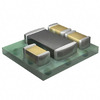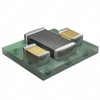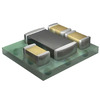Manufacturer Part Number
TPS82676SIPR
Manufacturer
Texas Instruments
Introduction
The TPS82676SIPR is a non-isolated point-of-load (PoL) DC-DC converter module from Texas Instruments. It is designed for use in a variety of commercial and industrial applications.
Product Features and Performance
Compact 8-pin uSIP (2.9x2.3mm) package
Integrated power switches, control, and compensation
High efficiency up to 90%
Wide input voltage range of 2.3V to 4.8V
Adjustable output voltage from 0.6V to 5.5V
Output current up to 600mA
Remote on/off control
Overcurrent, overvoltage, and overtemperature protection
Soft-start and low noise operation
Product Advantages
Compact size for space-constrained designs
High efficiency for improved power density and thermal performance
Wide input voltage range for flexibility in power supply design
Robust protection features for reliable operation
Easy to use with minimal external components
Key Technical Parameters
Input voltage range: 2.3V to 4.8V
Output voltage: 1.1V
Output current: 600mA
Efficiency: up to 90%
Operating temperature: -40°C to 85°C
Package: 8-pin uSIP (2.9x2.3mm)
Quality and Safety Features
RoHS3 compliant
Overcurrent, overvoltage, and overtemperature protection
Compatibility
Suitable for a wide range of commercial and industrial applications
Application Areas
Information technology equipment (ITE)
Industrial automation and control systems
Telecommunications equipment
Consumer electronics
Product Lifecycle
The TPS82676SIPR is an active product and is not nearing discontinuation.
Replacement or upgrade options may be available from Texas Instruments, depending on the specific application requirements.
Several Key Reasons to Choose This Product
Compact size and high power density for space-constrained designs
High efficiency for improved power management and thermal performance
Wide input voltage range and adjustable output voltage for design flexibility
Integrated protection features for reliable and safe operation
Easy to use with minimal external components, reducing design complexity




 TPS82675SIPRTexas InstrumentsDC DC CONVERTER 1.2V 0.72W
TPS82675SIPRTexas InstrumentsDC DC CONVERTER 1.2V 0.72W TPS82674SIPTTexas InstrumentsDC DC CONVERTER 1.2V 0.72W
TPS82674SIPTTexas InstrumentsDC DC CONVERTER 1.2V 0.72W